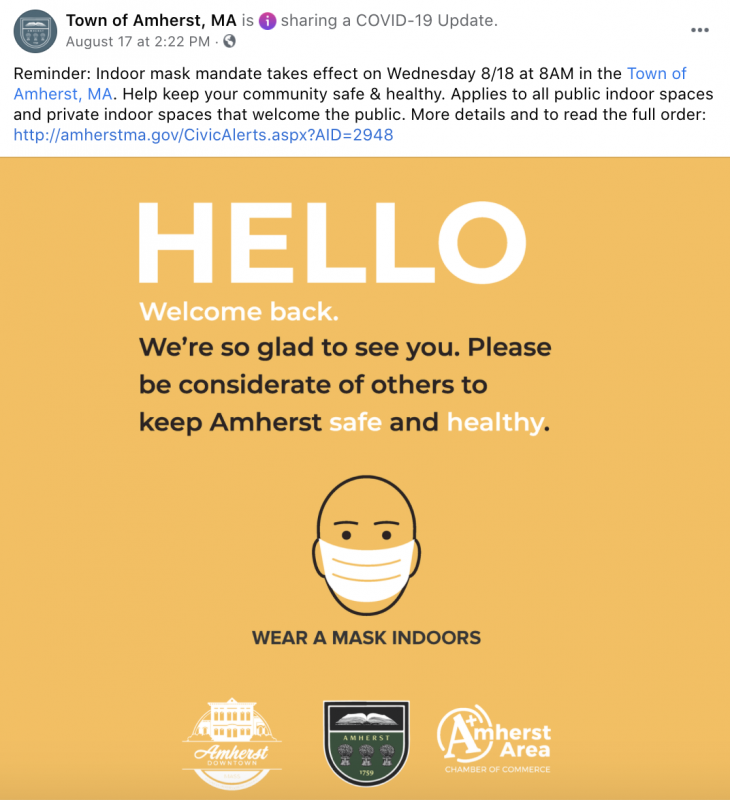8.6.10: Local Government and Social Media
- Last updated
-
-
Save as PDF
"All politics is local," the former Speaker of the House, Thomas P. "Tip" O'Neill, Jr. famously remarked, suggesting that people are intensely interested in the political matters they believe directly affect themselves, their families, and their communities. It follows from O'Neill's statement that much of what is political locally involves the policies and actions of local governments.
To build greater political engagement among people, cities and towns across the country are using social media to bring the local government to the people. For example, on social media, some communities livestream mayor, council, and selectboard meetings; send online memes, greetings, messages, and reminders to local individuals and groups; respond to people's requests for information and services; promote programs and initiatives by city and town departments; and notify everyone about natural disasters, impending weather, and other emergencies (The Truth about Local Government and Social Media, CivicPlus, 2020).

Figure \(\PageIndex{1}\): Town of Amherst, MA Facebook post about a COVID-19 mask mandate (August 2021)
Social media has been hailed as a way to promote what has been called digital democracy (or e-democracy or e-government). In theory, online access will give everyone in a community opportunities to express their views and influence public policy. The record to date has been far less than that, as one researcher noted, "democratic institutions have witnessed no digital revolution through the Internet" (Bastick, 2017, p. 3).
Still, can technology revolutionize democracy? One starting point for considering this question is analyzing how your local government uses social media and how might it use it more effectively and democratically.
Activity: Review and Improve Your Local Town Government's Use of Social Media
- Examine social media posts from your local city or town government over a period of 2-3 weeks.
- What type of information is posted?
- What visuals do they use in their posts? How might these visuals influence viewers' reactions to the information provided in the post?
- Do city or town officials reply to comments from viewers?
- How accessible are the posts?
- Is information available in multiple languages? Should it be?
- Use the Teacher and Student Guide to Analyzing Social Media to take a deeper dive into analyzing the use of social media by your local government.
- Then, compare how different departments (e.g., city or town council, police, schools, board of heath, recreation) use social media.
- Which one has the largest following on social media? Why do you think that is?
- Which one has the most engagement (e.g., replies, likes, shares)? Why?
- Are there differences in how these groups communicate with members of the community? If so, why do you think that is?
- Based on your findings and your own experiences with social media, write a proposal and design a video to help a local government department (e.g., town council, chamber of commerce, recreation) improve their use of social media to engage citizens.
Additional Resources
Connecting to the Standards
- Massachusetts Civics & Government Standards
- Explain the major components of local government in Massachusetts. (Massachusetts Curriculum Framework for History and Social Studies) [8.T6.10]
- ISTE Standards
- Knowledge Constructor
- 3b: Students evaluate the accuracy, perspective, credibility and relevance of information, media, data or other resources.
- 3d: Students build knowledge by actively exploring real-world issues and problems, developing ideas and theories and pursuing answers and solutions.
- Creative Communicator
- 6a: Students choose the appropriate platforms and tools for meeting the desired objectives of their creation or communication.
- 6b: Students create original works or responsibly repurpose or remix digital resources into new creations.
- 6d: Students publish or present content that customizes the message and medium for the intended audiences.
- DLCS Standards
- Interpersonal and Societal Impact (CAS.c)
- Collaboration and Communication (DTC.b)
- Research (DTC.c)
- English Language Arts > History/Social Studies Common Core Standards
- CCSS.ELA-LITERACY.RH.6-8.4
- CCSS.ELA-LITERACY.RH.6-8.5
- CCSS.ELA-LITERACY.RH.6-8.7
- CCSS.ELA-LITERACY.RH.9-10.4
- CCSS.ELA-LITERACY.RH.9-10.5
- CCSS.ELA-LITERACY.RH.11-12.5
- CCSS.ELA-LITERACY.RH.11-12.7


